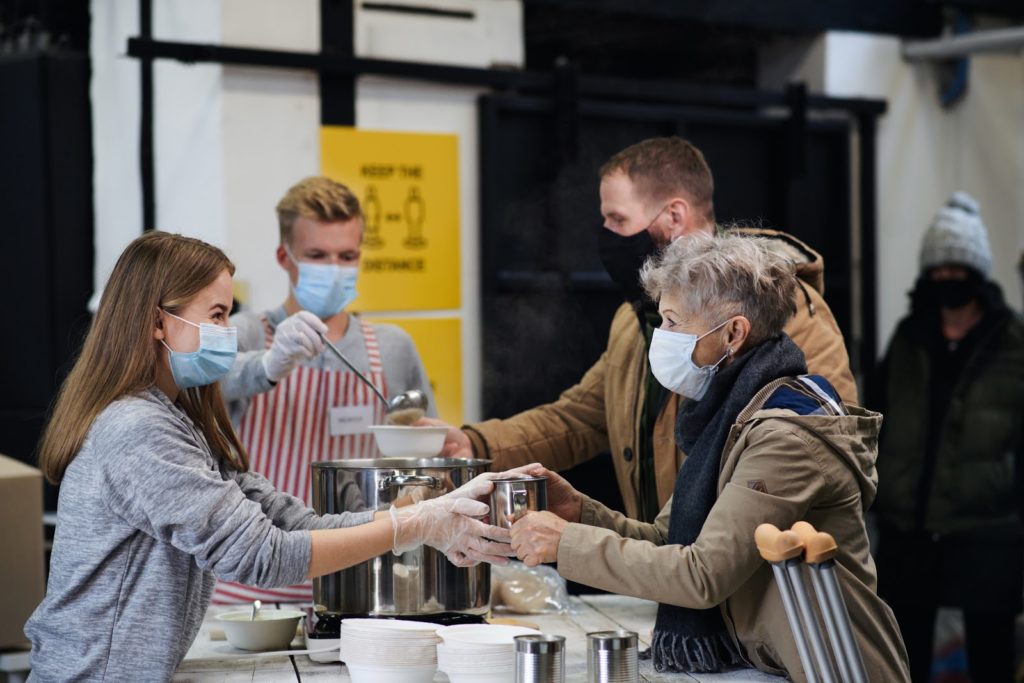6 Concrete Benefits of Peer Support for Addiction

Nothing makes life more meaningful than being surrounded by love and support. Having a community makes tough times manageable, challenges easier to overcome and daily life more enjoyable. Both our physical and mental health majorly benefit from time spent socializing. The support we give to and get from our circle of friends and family has the potential to change everything about our lives.
We are comfortable in most of our social groups because we share things in common. Whether that means relatives who share common blood or friends who share common interests, we engage with people best when we can relate. What happens, then, when we need support for addiction habits?
You probably have family and friends who are committed and supportive of your recovery and have made sacrifices to help you. Some of them may have even struggled with addiction themselves. But even well-meaning support from loved ones can feel ostracizing or belittling when it comes from people who don’t share in your struggle.
That’s where peer support for drug addiction comes into play. As with any challenge in life, having companions who are going through the same thing can offer encouragement and connection. Peer support in addiction recovery means that as part of treatment, individuals meet in groups with similar struggles to share, listen and discuss. Groups are intentionally nonprofessional and nonclinical.
What does peer support look like?
Peer support is offered in a variety of ways. Some of the most successful drug and alcohol treatment programs have utilized peer support for decades, capitalizing on the powerful influence of social groups. Alcoholics Anonymous is perhaps the most popular model of a peer support alcohol addiction group. Narcotics Anonymous, which operates similarly, also uses social support as an integral component of treatment.
Although these are established organizations that meet in groups in an effort to provide peer support in addiction recovery, there are other methods of treatment that use peer groups. Many addiction treatment facilities utilize group sessions to allow individuals a space to share and discuss their journey. Peer support also occurs in sober living homes for both men and women. Moreover, mentorship and sponsorship programs engage peers who have achieved long-term sobriety to assist those in the beginning stages.
You may be wondering: if these groups and methods of treatment are nonprofessional and nonclinical, do we know that they work? The answer is yes. There is an increasing amount of data that points to the effectiveness of peer support programs for drug addiction. A meta-analysis of nine studies published by the journal Substance Abuse and Rehabilitation found that peer support in addiction recovery is an effective component of treatment.
What are the benefits to peer support from addiction?
1. Decrease drug and alcohol usage
According to the study cited above, including peer support in addiction treatment decreased drug and alcohol usage. The study mentions that both mentors and mentees in a particular program were shown to have significant reductions in the amount and frequency of substance usage, or were able to completely maintain sobriety through the program and after.
2. Stick with the treatment
In addition to a decrease in substance use, peer support also increases the likelihood that a person will participate in a treatment program to completion. Compared to treatment modalities that did not incorporate peer groups, those that included a social component had more people complete the program.
3. Learn from a mentor
Often, peer support includes meeting with a mentor, either someone you chat with one-on-one or someone in a larger group who has achieved long-term sobriety and continues to engage in support groups. Learning from someone who has been in your shoes but is a little further along in his or her journey can instill a genuine sense of hope. Mentors help us to see that someone like us can overcome addiction.
4. Make new friends
Addiction can be extremely isolating. A peer group not only helps in recovery, but it can also be the beginning of life-long friendships. Often, the people you meet will be vulnerable and sympathetic, having experienced addiction first-hand. These friendships will remain strong because you’ll sincerely want the best for each other. With these strong foundations, you’ll be sure to make new best friends.
5. A sense of accountability
Community offers a sense of accountability that you won’t get from other forms of treatment. Peer support in addiction recovery is unique because there is social pressure to abstain from substances. This pressure is a positive pressure that stems from a desire to see those you care about make better lives for themselves. It will truly feel like a team effort as you seek sobriety together.
6. A sense of belonging
So many people are searching for their place in the world while facing addiction. If you’ve ever wondered where you belong and what your role is, you’re likely to find meaning by joining a peer support group. You’ll be inspired as people share their stories, and you’ll often get the chance to share your own.
People will impact your journey in personal ways and you’ll have the opportunity to inspire others as you reach milestones in your sobriety. You’ll feel a great sense of purpose knowing you are valued by a community, even if your past is messy.
If you’re looking to get serious about addiction treatment, call Pyramid Healthcare at (301) 997-1300 today. We offer support for individuals struggling with mental health and addiction as well as support groups for loved ones. No one can overcome addiction alone, and Pyramid Healthcare can offer you the community and hope you need when you reach out.
Nothing makes life more meaningful than being surrounded by love and support. Having a community makes tough times manageable, challenges easier to overcome and daily life more enjoyable. Both our physical and mental health majorly benefit from time spent socializing. The support we give to and get from our circle of friends and family has the potential to change everything about our lives.
We are comfortable in most of our social groups because we share things in common. Whether that means relatives who share common blood or friends who share common interests, we engage with people best when we can relate. What happens, then, when we need support for addiction habits?
You probably have family and friends who are committed and supportive of your recovery and have made sacrifices to help you. Some of them may have even struggled with addiction themselves. But even well-meaning support from loved ones can feel ostracizing or belittling when it comes from people who don’t share in your struggle.
That’s where peer support for drug addiction comes into play. As with any challenge in life, having companions who are going through the same thing can offer encouragement and connection. Peer support in addiction recovery means that as part of treatment, individuals meet in groups with similar struggles to share, listen and discuss. Groups are intentionally nonprofessional and nonclinical.
What does peer support look like?
Peer support is offered in a variety of ways. Some of the most successful drug and alcohol treatment programs have utilized peer support for decades, capitalizing on the powerful influence of social groups. Alcoholics Anonymous is perhaps the most popular model of a peer support alcohol addiction group. Narcotics Anonymous, which operates similarly, also uses social support as an integral component of treatment.
Although these are established organizations that meet in groups in an effort to provide peer support in addiction recovery, there are other methods of treatment that use peer groups. Many addiction treatment facilities utilize group sessions to allow individuals a space to share and discuss their journey. Peer support also occurs in sober living homes for both men and women. Moreover, mentorship and sponsorship programs engage peers who have achieved long-term sobriety to assist those in the beginning stages.
You may be wondering: if these groups and methods of treatment are nonprofessional and nonclinical, do we know that they work? The answer is yes. There is an increasing amount of data that points to the effectiveness of peer support programs for drug addiction. A meta-analysis of nine studies published by the journal Substance Abuse and Rehabilitation found that peer support in addiction recovery is an effective component of treatment.
What are the benefits to peer support from addiction?
1. Decrease drug and alcohol usage
According to the study cited above, including peer support in addiction treatment decreased drug and alcohol usage. The study mentions that both mentors and mentees in a particular program were shown to have significant reductions in the amount and frequency of substance usage, or were able to completely maintain sobriety through the program and after.
2. Stick with the treatment
In addition to a decrease in substance use, peer support also increases the likelihood that a person will participate in a treatment program to completion. Compared to treatment modalities that did not incorporate peer groups, those that included a social component had more people complete the program.
3. Learn from a mentor
Often, peer support includes meeting with a mentor, either someone you chat with one-on-one or someone in a larger group who has achieved long-term sobriety and continues to engage in support groups. Learning from someone who has been in your shoes but is a little further along in his or her journey can instill a genuine sense of hope. Mentors help us to see that someone like us can overcome addiction.
4. Make new friends
Addiction can be extremely isolating. A peer group not only helps in recovery, but it can also be the beginning of life-long friendships. Often, the people you meet will be vulnerable and sympathetic, having experienced addiction first-hand. These friendships will remain strong because you’ll sincerely want the best for each other. With these strong foundations, you’ll be sure to make new best friends.
5. A sense of accountability
Community offers a sense of accountability that you won’t get from other forms of treatment. Peer support in addiction recovery is unique because there is social pressure to abstain from substances. This pressure is a positive pressure that stems from a desire to see those you care about make better lives for themselves. It will truly feel like a team effort as you seek sobriety together.
6. A sense of belonging
So many people are searching for their place in the world while facing addiction. If you’ve ever wondered where you belong and what your role is, you’re likely to find meaning by joining a peer support group. You’ll be inspired as people share their stories, and you’ll often get the chance to share your own.
People will impact your journey in personal ways and you’ll have the opportunity to inspire others as you reach milestones in your sobriety. You’ll feel a great sense of purpose knowing you are valued by a community, even if your past is messy.
If you’re looking to get serious about addiction treatment, call Pyramid Healthcare at (301) 997-1300 today. We offer support for individuals struggling with mental health and addiction as well as support groups for loved ones. No one can overcome addiction alone, and Pyramid Healthcare can offer you the community and hope you need when you reach out.







